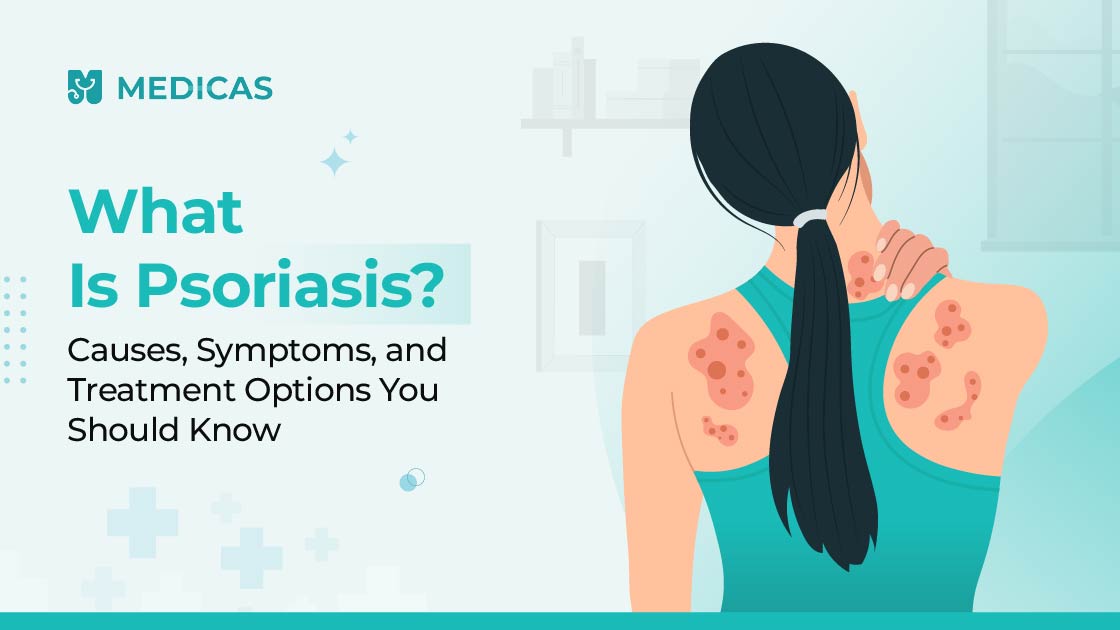You know that moment when your skin starts acting up, and no cream, scrub, or pep talk seems to work? Yep, it might be psoriasis making an entrance. It’s not contagious, it’s not your fault, and no, your skin isn’t just being dramatic. Psoriasis is a common (and stubborn) condition, but once you understand what’s going on, it becomes a lot less intimidating. Whether you’re newly diagnosed or just curious, we’re breaking down the causes, symptoms, and smart ways to treat it. Let’s talk about skin, simply.
What Is Psoriasis?
Psoriasis is a chronic autoimmune condition that speeds up the skin cell cycle. Normally, skin cells take weeks to rise and shed, but with psoriasis, this process occurs in just a day, resulting in a rapid buildup on the skin’s surface. This leads to thick, silvery scales and red, inflamed patches, which are commonly associated with the condition.
Psoriasis as a Skin Disease
While psoriasis primarily affects the skin, its impact can extend beyond visible symptoms. It can also affect the nails, causing them to become discoloured, pitted, or crumbly. In some cases, it can even lead to psoriatic arthritis, a type of inflammatory arthritis that affects the joints, causing pain, stiffness, and swelling. It’s crucial to understand that psoriasis is not contagious; you cannot catch it from someone who has it. It’s an internal process driven by the body’s immune system, which mistakenly attacks healthy skin cells. It is essential to visit a dermatologist to confirm you psoriasis diagnosis. You can either schedule a consultation with a dermatologist near you or speak with me directly via Medicas.
What Causes Psoriasis?
The exact causes are still being researched, but it’s understood to be a complex interplay of genetic predisposition and environmental triggers. It’s not caused by poor hygiene or an infection; rather, it’s an immune system dysfunction.
Genetic and Environmental Triggers
If you have a family history of psoriasis, your risk of developing the condition is higher. This suggests a significant genetic component. However, genetics alone aren’t enough; environmental triggers often play a crucial role in initiating or exacerbating the condition. These triggers can vary greatly from person to person.
Common Risk Factors
Several factors can increase an individual’s risk of developing psoriasis or triggering flare-ups:
- Stress: Can trigger or worsen psoriasis symptoms.
- Infections, especially strep throat, may cause flare-ups.
- Skin injury: Cuts or burns can lead to new lesions (Koebner phenomenon).
- Smoking: Raises the risk and severity, and reduces the effectiveness of psoriasis treatment.
- Alcohol: Heavy drinking worsens psoriasis symptoms and affects medication.
- Medications: Some drugs, like lithium and beta-blockers, can trigger psoriasis.
- Obesity: Increases risk and severity of the condition.
Symptoms of Psoriasis
The symptoms of psoriasis can vary widely in appearance and severity, depending on the type of psoriasis and the individual.
Identifying Early Signs
Understanding the early symptoms of psoriasis is crucial for taking timely action. Some of the typical signs include:
- Red or inflamed skin patches
- Thick, silvery-white scales
- Dry or cracked skin that may bleed
- Burning or itching sensation
- Discoloured or pitted nails
Types of Psoriasis
Psoriasis disease manifests in several forms, each with its unique characteristics:
| Type | Appearance | Common Locations |
| Plaque | Raised, inflamed patches with silvery scales | Elbows, knees, scalp, lower back |
| Guttate | Small, drop-shaped spots | Trunk, limbs |
| Inverse | Smooth, red patches in skin folds | Armpits, groin, under breasts |
| Pustular | White pustules surrounded by red skin | Hands, feet, widespread |
| Erythrodermic | Widespread redness and shedding of large sheets of skin | Entire body (rare) |
Psoriasis vs Eczema: How Are They Different?
It’s common for people to confuse eczema and psoriasis due to their similar appearances.
| Feature | Psoriasis | Eczema |
| Cause | Autoimmune-driven accelerated cell growth | Barrier dysfunction & immune response |
| Appearance | Well-defined plaques with silvery scales | Red, itchy patches; often weepy or crusted |
| Itch Intensity | Moderate to severe, often burning sensation | Intense itching and scratching lead to raw skin |
| Typical Locations | Elbows, knees, scalp, lower back | Flexural areas: inside elbows/knees, wrists, neck |
| Age of Onset | Teens to early 30s commonly | Often in infancy or childhood |
| Treatment Response | Responds well to immunosuppressants & biologics | Moisturisers, topical steroids, barrier repair |
Eczema and psoriasis require different approaches, so a correct diagnosis is key. Consider an online doctor consultation or book an appointment for a clinical evaluation.
How to Treat Psoriasis
While there is currently no permanent cure for psoriasis, a wide range of treatment options is available to manage symptoms, reduce flare-ups, and improve quality of life. Also Read: Is your derma roller effective?
Medical Treatments
Psoriasis treatment depends on the severity of the condition.
| Treatment Type | Examples | Use |
| Topical Creams | Corticosteroids, Vitamin D ointments | Mild to moderate cases |
| Systemic Medications | Methotrexate, Cyclosporine | Moderate to severe cases |
| Biologics | Adalimumab, Etanercept | Severe or unresponsive cases |
| Phototherapy | UVB Light Therapy | Used in controlled medical setups |
All treatments should be taken under medical supervision. You can also book a lab test to monitor side effects of long-term medications.
Home Remedies and Lifestyle Changes
Many patients find improvement with supportive care:
- Regular moisturising with petroleum jelly or coconut oil
- Avoid harsh soaps and very hot water
- Take warm (not hot) baths with Epsom salt
- Manage stress with yoga or deep breathing
- Use humidifiers in dry climates
While home remedies can help reduce discomfort, they do not replace medical treatment. Also Read: Healthy Skin Diet: Foods That Makes Skin Glow Naturally
Living With Psoriasis
Living with a chronic condition like psoriasis can be challenging, but with proper management and support, you can lead a fulfilling life.
Managing Flare-ups and Triggers
Managing psoriasis skin disease is more about consistency. Patients should:
- Identify personal triggers (e.g., specific foods, stress)
- Avoid scratching the affected skin
- Keep nails short to prevent infection from scratching
- Wear breathable cotton clothing
- Maintain a healthy weight and diet
When to See a Doctor
Consult a doctor if:
- Patches start spreading rapidly
- You have pain in joints (could be psoriatic arthritis)
- Over-the-counter creams are not helping
- There are signs of infection, like pus or fever
It is always better to take an online doctor consultation if you’re unsure or want expert advice without having to step out.
Conclusion
Psoriasis isn’t always predictable, but getting help doesn’t have to be complicated. If your skin is sending signals you’re not sure how to read, it might be time to check in with someone who understands. Book an appointment with a dermatologist on Medicas—fast, fuss-free, and from wherever you are. Your skin’s been waiting for this kind of backup.
Frequently Asked Questions
-
What is psoriasis, and what causes it?
Psoriasis is a chronic autoimmune condition characterised by rapid skin cell buildup, resulting in red, scaly patches. Causes include genetics, immune system issues, and triggers like stress or infections.
-
How is psoriasis different from eczema?
Psoriasis causes thick, scaly patches and is an autoimmune condition, while eczema usually leads to dry, itchy skin due to allergies or irritation.
-
What treatments are available for psoriasis?
Treatments include topical creams, phototherapy, oral medications, and biologics, all tailored to the severity and symptoms of the condition.
-
Can psoriasis be cured permanently?
There is no permanent cure, but psoriasis symptoms can be effectively managed with proper treatment.
-
What is the main cause of psoriasis?
The primary cause is an overactive immune system that accelerates skin cell production.
Disclaimer
Medical Advice: The information provided in this blog post is for educational purposes only and should not be considered as a substitute for professional medical advice, diagnosis, or treatment. Always consult with a qualified healthcare professional for personalized guidance regarding your specific medical condition.
Accuracy of Information: While we strive to provide accurate and up-to-date information, the field of medicine and viral fevers is constantly evolving. The content in this blog post may not reflect the most current research or medical guidelines. Therefore, it is advisable to cross-check any information provided with reliable sources or consult a healthcare professional.
Individual Variations: The symptoms, causes, treatment options, and preventive measures discussed in this blog post are general in nature and may not apply to everyone. It is important to remember that each individual’s situation is unique, and personalized medical advice should be sought when making healthcare decisions.
External Links: This blog post may contain links to external websites or resources for additional information. However, we do not endorse or have control over the content of these third-party websites. Accessing these links is done at your own risk, and we are not responsible for any consequences or damages that may arise from visiting these external sources.
Results May Vary: The effectiveness of treatment options or preventive measures mentioned in this blog post may vary from person to person. What works for one individual may not work the same way for another. It is essential to consult with a healthcare professional for personalized advice tailored to your specific needs.



